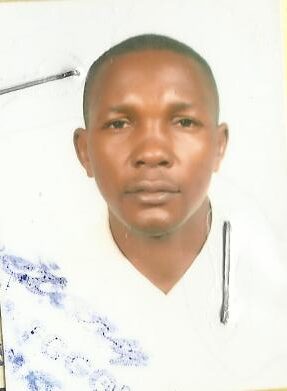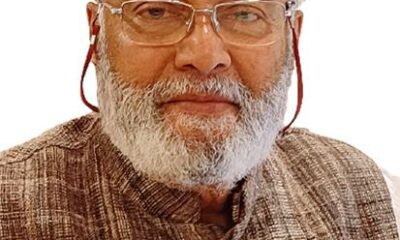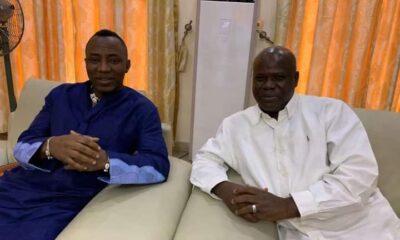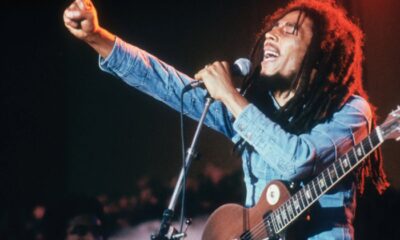Democracy & Governance
Democratisation Of Aren Eggon Institution: Its Consequences -By Abene Umbugadu Abene
Today it is evidentially clear that the democratization of the Aren Eggon institution remain an acceptable development in Eggon land . But however, the Democratic arrangement for electing Aren Eggon attracts some implications which are stated as follows.

The people referred to as Eggon have been an ethnic group that inhabited the hill ( Eggon hills) as far back as 13th century A.D.Today the area fall within the geo political unit call Nasarawa Eggon local government of nasarawa state.in the north Central of northern Nigeria.
The political history of the Eggon people in precolonial epoch is characterized by decentralized form of government described as segmentary. There was no central government with a single person wielding power and authority over the entire ethnic group. Instead they ruled by the council of elders called Moa’andakopo Ashim and Adan Ubin at the clan level. However, with the advent of the British in 1907 and subsequently the conquest of eggon land in 1917, the existing political organization became altered for the first time in the history of the Eggon (1922) a central ruler was appointed as the district head , and this was to archived the purpose of indirect rule system. This development has later advanced to the stage that the chieftaincy institutions became democratized.
The democratization of Aren eggon institution ,however, traced back to 1953 when attempt by the British authority to democratized the Aren eggon institution failed. After the period of interregnum (1943_1953) During this period, the Eggon has three chiefdoms. Eholo ruled by Ally Angbi,
Anzo rule by Angibi Aku’abla and
Eggon Eroh ruled by Angbalo Allaphubu,
the British authority decided to appoint a central chief for the Eggon people. Thus they directed all the Eggon people to meet and select one person for the for the post of district head of Eggon Nation ( Aren eggon). This development was the first of it kind in the history of Eggon. Unlike in the past when the British authority had embarked on the express appointment of Bashayi Yamusa.( A Fulani man from keffi) in 1926, Idde Ebi 1926, Alumbigu Tsawhwi in 1927, Abimiku Allumbugu 1942 and in 1943 the three district heads (ALU Angbi, Angbi Aku’abla and Angbolo Aluphubu,) The Eggon people wee allowed to select their Paramount chief. In response, some Eggon sons indicated their interest and campaign for the Aren eggon stool. These include, Abgbren Kutsa ( son of Ambe the village head of Wana during the Bashayi era), Abdulahi Idde ( Treasurer with the native authority at Wamba), ALU Angbi ( the Chief of Eholo), Musa Galle ( one time messenger to the Divisional Officer at Wamba),Since this process of selecting a central chief was strange in Eggon land, the Eggon people found it very difficult to successful conduct election and present a person. The deep division existing between vthe Eholo Clan and Anzo clahas further complicated the electoral arrangement and there was a deadluck. As the Democratic excise failed, the British authority summoned the Eggon people at Gako in October 1953 and appointed Abdulahi Idde as the district head of Eggon district. (Aren Eggon). It is largely believed that the appointment of Abdulahi Idde as the Aren eggon was as a result of working experiece and relationship with the Divisional Officer at Samba, and couple with the facts that his faith as a Muslim attracted the support of Sir Ahmadu Bello. (The sarduna of sokoto) who influenced his appointment as Aren eggon.
It is however, important to note that despite the inability of the Eggon people at that time to select and present a by for the post of district head of Eggon ( Aren eggon), there was evidence of a Democratic process on course and this has laid a solid foundation for future Democratic arrangement for the Aren eggon stool.
After experiencing different developmental process , the Aren eggon institution has developed and advanced to a stage that the institution became practicable possible in 1981 when Abdulahi Idde died. But before then in 1974, the Divisional officer vof Akwanga local government authority, Mr D.Kure directed all the stake holders of Eggon, Numku, and wamba to meet and draw modalities for the process of selecting their Paramount chiefs ( I.e Aren eggon, Sarki Nunku, And Sarki Wamba respectively).
In compliance, the Eggon stakeholders ( the Aren eggon, Eggon council of elders, district heads, village heads, ward heads, councillors among others) converged at nasarawa Eggon and deliberated on issues. At the end, they came out with the following resolution.
1. That since no family or group in Eggon land could historically lay claim to any past conquest, early settlement or the establishment of a centralized headship in Eggon land, the Aren eggon stool which is a product of the British indirect ruleis declared free for all Eggon male adult.
2. On the death of the Aren eggon, the Aren eggon stool shall be declare vacant and election shall be conducted to usher in a new Aren eggon.
3. Twenty two village heads were identified and recognized for the electoral college for the Aren eggon stool.
These resolution were gazetted and the Aren eggon institution became democratized. In the program for the official installation of Aren Eggon b( Dr Bala Abaine Angbazo) on the 12th February, 1983.it was cited:
” The Aren Eggon stool being a colonial creation for administrative convenience, eligibility to the throne is open to all adults male indigenes of Eggon tribe “
With the death of Abdulahi Idde on the 6th may, 1981, the vacant stool of Aren Eggon was advertised for election . Thus eight Eggon sons applied and the election was conducted on the 12th July, 1981.Those that contested for the for the Aren Eggon stool include, Alhaji Abdulahi Angibi ( Son of Angibi Aku’abla the former chief of Anz), Mr Esla Samson ALU ( son of ALU Angbi the former chief of Eholo), Mallam Usman Angbolo. ( son of Angbolo Alaphubu former chief of Eggon Eroh), Mr Jatau S. Anga , Alhaji Adamu Musa Galle, Mr Bala Abaine Angbazo ,Mallam Ali Idde( brother to late Abdulahi Idde) and Mallam Idris Mohammed Gamna.
For the purpose of this election, the then Plateau state government under the leadership of Mr Solomon Dauship Lar instituted a committee under the chairmanship of Mr Otaki Onyigbenu. (/the former secretary to Plateau state ministry of local government and chieftaincy affairs) and conducted the election . the twenty two King makers who constituted the electoral college include:
Mr Akyen Namo Aren Wana,
Mr Azime Umbugadu Aren Wakama.
Mallam Yusuf Dauda Aren Alogani,
Mallam Ali Gambo Aren Agunji,
Mr Agyo Angbi Aren Umme,
Mr Tsona Kuje Aren wangibi
Mallam Musa Aliyu Jatau Aren Angbashiru
Mallam Musa Envulanza Aren Lezzi Keffi.
Mr Anzabogo Aren Ekka,
Mr Tabe Angbi Aren Finds,
Mr Peter Nangba Aren Alushi,
Mr Envuloludu Akpakyu Aren Wulko,
Mr Avre Ezu Aren Wolon,
Mr Ombugadu Alla Aren Ezzen,
Mr Anza Angbi Aren Alizaga ,
Mr Alla kuson Aren Lambaga,
Mr Malls Najo Aren Arikpa,
Mr Ambaga Affi Aren Ogba,
Mallam Adamu Ekpa Aren Galle,
Mallam Mohammed Gama Ekka Aren Bakyano NASA, and
Mr Audu Eggs Aren Arugbadu.
The election result was as follows:
1 Mr Bala Abaine Angbazo =8 votes
2 Alhaji Adamu Musa Galle =7 Votes
3 Mr Esla Samson ALU =5 votes.
4 Mallam Ali Idde = 2 Votes
5 Mr Jatau S.Anga = No votes
6 Alhaji Abdulahi Angibi =No vote
7 Mallam Usman Angbolo= No vote
8 Mallam Idris Mohammed = No vote
With this election result, Mr Bala Abaine Angbazo emerged winner and was declared the Paramount chief of Eggon ( Aren Eggon). This election result was approved by His Excellency Solomon D.Lar the then Plateau state governor on the 30 July ,1981. Mr Bala Abaine Angbazo, however, came to the throne as a second class chief but on 1st June 1982, the Aren Eggon stool was upgraded to First class status. Mr Bala Abaine Angbazo was officially presented with a staff of office on the 12rh February 1983. -2022
Today it is evidentially clear that the democratization of the Aren Eggon institution remain an acceptable development in Eggon land . But however, the Democratic arrangement for electing Aren Eggon attracts some implications which are stated as follows.
The Democratic arrangement is considered very loose. Apart from sex and age limit, no other restrictions are attached to the conditions for electing Aren Eggon. This has created the tendency and possibility bin which unpopular and inexperienced people with wealth and influence could the electoral process and manipulate their way into the throne. This could result to weak and ineffective leadership in Eggon land. Also , as observed by Dr. Obadiah Awu” Since the Democratic arrangement for selecting an Aren Eggon is not restricted to a category of people in Eggon land, a large numbers of unqualified male adults may indicate interest thereby making the contestation more complex and crisis-oriented in the nearer future. “
In addition, the absence of rotational or zoning formula for the election of Aren Eggon could greatly compound the problems of clanish sentiment which to extent have destroyed vthe unity of Eggon people over the time. Presently, it is on record that the Anzo clan dominated the Aren Eggon stool.
This development could be seen as unfair band unjust to both the people of Eggon Eroh and Eholo clans. And in an event that the present Aren Eggon dies, and his successor belong to the Anzo clan,therefore, there is every possibility that the people of Eggon Eroh and Eholo will feel marginalized. The effect of this if not averted now may be far reaching on the unity of the Eggon ethnic group.
It is also evident that the electoral provision for electing Aren Eggon have ignored the issues of experience which is necessary for effective leadership . It is important that the Aren Eggon stool should be restricted to some categories of persons who have acquired adequate knowledge and experience on the tradition and customary ways of leadership in Eggon land .Such experience people could offer better leadership than those without previous experience on Eggon chieftaincy institution among othwr norms and value of the people.
In addressing these problems associated with the democratization of Aren Eggon institution, the following recommendations are made as solution to avoid future crisis.
First, the loose democratic arrangements for the selection of Aren Eggon should be reorganized. There should be restriction in the contestation for Aren Eggon stool to a category of experience people such as the District Heads,Village Heads, Eggon Council of elders and the Eggon Chieftaincy Title Holders.This arrangement will in no small measure avert future crisis and leadership ineptitude in Eggon land.
Secondly, in solving the problems of one clan dominating as stress above, there should be a rotational and zoning formula in the election of Aren Eggon. This rotational and zoning arrangement should revolves round the three major clans bin Eggon land. (I.e Anzo ,Eholo,and Eggon Ero.)
This is one lasting solution that will bring about peace, stability, progress and unity in Eggon land.
Finally, undue government interference in the selection of Aren Eggon is one major problem that must be avoided. The government as a matter of expediency, should endeavour to abide by the decision of the king makers during the election of th Aren Eggon. This is very important because government interference in chieftaincy matters has led to several devastating consequences on the economy and the society at large..
Conclusion: It is hope that the Eggon stakeholders will look into these problems and come up with lasting solution so as to avert future crisis that may destroy the unity of the Eggon peoples.
Thanks and may the peace of God remain with us now and forever. Amen.
Abene Umubugadu Abene is a senior advocate of Nigeria students and a final year History student of Nasarawa state university keffi.
Names
Bashayi Yamusa
Period of reign 1922-1926
Clan. A Fulani man from keffi.
Idde Ebi
Six months( June 1926_Dec.1926)
Alogani.
(Anzo clan)
Alumbugu Tsahwi
1927_1942
Wanna ( Eholo clan)
Abimiku Alumbugu
Six months September 1942 _Feb.1943
Wanna (Eholo Clan)
No Aren Eggon
1943_1953
No Aren Eggon
Alhaji Abdulahi Idde
1953_ 1981
Alogani ( Anzo Clan)
Dr Bala Abaine Angbazo
1981 to 2022
Wakama (Anzo Clan)
Thanks and may God bring peace, unity and progress to Eggon nation now and forever. Amen.
WRITTEN BY
Abene Umubugadu Abene the senior advocate of Nigeria students and a graduate of History from Nasarawa state university keffi.
CONTACT, 08065315489










